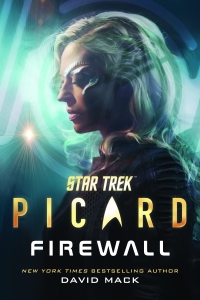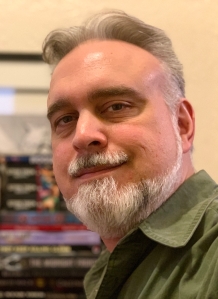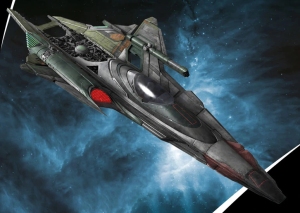Star Trek: Feature: Picard: Empathy Is So Punk Rock
Kirsten Heffron investigates how an Aussie punk band inspired Seven of Nine’s coming of age story in Star Trek: Picard: Firewall (NB There are some spoilers for Firewall within.) The […]
Kirsten Heffron investigates how an Aussie punk band inspired Seven of Nine’s coming of age story in Star Trek: Picard: Firewall (NB There are some spoilers for Firewall within.) The […]
 Kirsten Heffron investigates how an Aussie punk band inspired Seven of Nine’s coming of age story in Star Trek: Picard: Firewall
Kirsten Heffron investigates how an Aussie punk band inspired Seven of Nine’s coming of age story in Star Trek: Picard: Firewall
(NB There are some spoilers for Firewall within.)
The early chapters of David Mack’s Star Trek: Picard: Firewall find former Borg drone Seven of Nine suffering in lonely, self-imposed exile to the gritty, outermost colony worlds of the United Federation of Planets after her applications for Federation citizenship and a Starfleet commission have been rejected because of her Borg past. In the midst of what has become a mind-numbingly isolated and boring existence (even she admits that she’s not really living), she finds solace and brief moments of emotional connection in a way that some Voyager fans may think of as unexpected: dancing in the mosh pit at a gay punk nightclub called Monsoon.
For fans of Star Trek: Picard, the mental image this conjures might not be quite so surprising, as Seven effectively “came out” as queer in that show’s first season when she began a romantic relationship with Raffaela “Raffi” Musiker. Likewise, if you know anything about queer culture, it makes even more sense, as punk and the queer community have always been tightly intertwined. With all this in mind, the intersection of punk music and queer culture feels like a fitting setting from which to launch Seven’s coming-of-age story.
Punk, with its rebellious spirit and DIY ethos, has long been a refuge for those who exist on the fringes of society. Its raw aggression and unapologetic attitude echo Seven’s own defiance in the face of those who repeatedly try to shape or define her in ways that leave her feeling rejected, misunderstood, and uncomfortable in her own skin. In Monsoon’s mosh pit, she finds a community that accepts her for who she is, Borg past and all.
Writes Mack:
This was what [Seven] lived for, looked forward to all week long: a night of release, a night to purge her anger, her sorrow, her loneliness, by surrendering herself to the chaos of the mosh pit. Bodies colliding and caroming, driven by the music to lose themselves in moments of wild movement, a maelstrom of flesh and bone.
It had intimidated Seven when she first encountered it, but in time she saw the truth that was hidden in the pantomime of violence. No one was in the mosh pit to hurt people. They were all hungry for contact, for connection, for a sense of belonging to something greater (Firewall, pp. 21-22)
 “The club is basically Seven’s learning area,” says Mack. “This is where she’s trying to figure stuff out, and it’s the closest thing she has found to a safe space – a place where she belongs, where even if she doesn’t fit in, it’s okay, because nobody fits in, it’s where the outcasts go.”
“The club is basically Seven’s learning area,” says Mack. “This is where she’s trying to figure stuff out, and it’s the closest thing she has found to a safe space – a place where she belongs, where even if she doesn’t fit in, it’s okay, because nobody fits in, it’s where the outcasts go.”
Mack says Monsoon’s social scene was inspired in part by the lyrics and sound of “Freaks to the Front” by Australian punk foursome Amyl and The Sniffers:
Freaks to the freaks to the freaks
To the freaks to the front
If they don’t like you as you are
Just ignore the c*nt
Freaks to the freaks to the freaks
To the freaks to the front
Everyone in this room deserves to have fun
–Amyl and The Sniffers, “Freaks to the Front”
The first time we see Seven in this setting, we get to peek in at her thoughts as she clumsily (but with electric excitement) accepts the romantic advances of a fellow mosher, then takes the woman back to her flat for what turns out to be a slightly awkward one-night stand. Afterward, we witness her bitter disappointment: “I thought it would be transcendent. But it just feels… tawdry,” she laments the next morning, as she wakes up alone in her flat and realizes that her partner has already slipped out the door without even leaving a note.
Mack recently shared on his website an inspirational playlist of the music he listened to as he wrote the novel, and the first thing you’re likely to notice when you check it out is that Amyl and The Sniffers are in very heavy rotation. The band is even given a sort of cameo turn in the novel with a band called “Amyl’s Night Rate,” who provide the musical backdrop for Monsoon’s mosh pit, and they inspired the name of the book’s iconic Starfire 500 prowler ships flown by the Fenris Rangers (“Starfire 500” is the title of one of their songs, named for a popular model of roller skates). The Monsoon nightclub was likewise named after one of the group’s tracks.
Mack says he discovered Amyl and The Sniffers by chance around the same time he started writing Firewall, after their song “Hertz” was featured in the Hulu comedy Letterkenny. An avid punk fan since his youth, he liked the sound so much that he looked up the rest of their discography, and quickly noticed that their lyrics echoed many of the same themes Seven would be wrestling with in Firewall: her evolving independence, her search for meaning and purpose, her attempts to connect (emotionally, physically, sexually) with others and the frustration she feels when she fails.
But Amyl and The Sniffers don’t just offer a great soundtrack for Seven’s social angst – like most punk artists, they’re nakedly political with a strong social justice bent. That means they’re also a great fit for the larger plot of the story, which sees Seven tasked with infiltrating a vigilante group called the Fenris Rangers as a spy for the Federation Security Agency, only to discover that the Rangers are the only thing standing between the powerless residents of Federation protectorates at the edge of the Neutral Zone and the greedy warlords and thugs who are trying to exploit them.
Mack points to the track “Gacked on Anger” as being representative of the rising rage Seven feels as she is exposed to injustice after injustice – not just against herself, but against the innocent civilians of the Qiris sector – and her frustration at the Federation’s refusal to intervene. (“Gacked” is Aussie slang for the type of high one would get from a hard stimulant drug like cocaine.)
“I wanna help out the people on the street
But how can I help them when I can’t afford to eat?
How do I survive? How do I get by?
I can’t go to sleep ’cause there’s trouble in my mind”
–Amyl and The Sniffers, “Gacked on Anger”
 “Seven is full of anger at the beginning of the story,” Mack says. “She’s got all these leftover negative feelings from being discriminated against, from being shut out, from feeling like she was humiliated and embarrassed, or that she was used to humiliate or embarrass Admiral Janeway, and this has basically left her full of this pent-up rage.
“Seven is full of anger at the beginning of the story,” Mack says. “She’s got all these leftover negative feelings from being discriminated against, from being shut out, from feeling like she was humiliated and embarrassed, or that she was used to humiliate or embarrass Admiral Janeway, and this has basically left her full of this pent-up rage.
“Rage,” Mack is quick to add, “is a very specific kind of anger.” For rage to be present, he explains, you need two things: “Anger – specifically righteous anger – and the inability to rectify the situation. It’s basically fury plus helplessness.”
Rage is the emotion at the heart of a lot of Amyl and The Sniffers’ music, but not in a nihilistic or depressing way. The band’s lead singer, Amy Taylor, has a sort of deranged cheerleader energy that often gives their music a defiantly hopeful sound, even as their lyrics express deep anger at injustice.
Take these lyrics from “Choices” – a song that didn’t make Mack’s playlist, but seems a perfect fit for Seven’s journey toward true individuality:
I don’t want unsolicited advice
I might succeed, I might get in strife
But my choice is my own
My voice, my own
My life is my own
I own it, I own it
…
You’ve never stepped foot in the things I’ve lived through
You aren’t aware of what I’m looking for in life
I stand tall in the person that I am
Continue along in my own right
And I would rather figure it out the hard way
Even if it takes a little more time
I want all the experiences I have
To be explicitly, exclusively mine
 As Firewall’s story progresses, Seven does, in fact, figure many things out the hard way. We witness her anguish as she visits the site of a mass grave of 80,000 innocent men, women, and children – all murdered by a sociopathic warlord just to prove a point. We see her fall apart as she reclaims her human empathy and finally grasps the full magnitude of the atrocities she was party to as part of the Borg Collective. Then we get to watch as she learns to channel her righteous rage into righteous action… ultimately taking down the warlord, exposing his financial and political network, and forcing the Federation to recognize the Fenris Rangers’ legitimacy as a law enforcement agency, and even as a valued partner.
As Firewall’s story progresses, Seven does, in fact, figure many things out the hard way. We witness her anguish as she visits the site of a mass grave of 80,000 innocent men, women, and children – all murdered by a sociopathic warlord just to prove a point. We see her fall apart as she reclaims her human empathy and finally grasps the full magnitude of the atrocities she was party to as part of the Borg Collective. Then we get to watch as she learns to channel her righteous rage into righteous action… ultimately taking down the warlord, exposing his financial and political network, and forcing the Federation to recognize the Fenris Rangers’ legitimacy as a law enforcement agency, and even as a valued partner.
On a personal level, we see Seven forging new and deeper relationships outside the formal structure of Starfleet. She finds a found family in the Fenris Rangers, including her first serious girlfriend in fellow Ranger Ellory Kayd and a father-figure/mentor in her trainer, Ranger Keon Harper. We see her experience loss – not her first loss, to be sure, but the way she processes her grief this time feels much more human than we’ve seen from her in the past.
Best of all, we see her finally learn to really accept herself for the first time, Borg bits and all, and demand to be recognized on her own terms:
“The things I did when I was a drone . . . I feel shame for them because those were things I did, whether I wanted to or not. I will always regret the atrocities I was forced to commit. . . . But I will not be shamed because I still have some of my old Borg implants, or because I still have nanoprobes in my blood. Those are just part of who I am. What matters isn’t where they came from, but what I do with them.” (Firewall, p. 309)
…
“As long as governments abandon their people to predators, I plan to be there, a firewall defending the innocent from evil.” (Firewall, p. 314)
…
“You’re right about one thing. I am part Borg. I will always be part Borg. But I will never let anyone shame me again for being who I am.… And I will never, ever let anyone tell me again that I don’t know my own fucking name.” (Firewall, p. 300)
By the novel’s end, Seven is no longer “Gacked on Anger.” Instead, she’s gacked on empathy, righteous justice, self-determination, queer love … and the occasional well-timed f-bomb.
And honestly, what could be more punk rock than that?
Star Trek: Picard: Firewall is out now from Gallery Books; click here to read our review